Treats
Treats
Drinks
RUITF AKEC
FRUIT CAKE
Fun Facts:
The simple holiday fruitcake has been to outer space, served as the world’s first energy bar, and is an international $100 million business. However, despite all of these achievements, this ancient Roman dessert is still the target of countless jokes. As we approach the final days of National Fruitcake Month, here is a look at the history of one of the world's most hated/loved cakes of all time.
Fruitcake’s great, great, grandfather is the Roman Satura. The ancient Romans were looking for a way to sustain their troops in battle and developed a bread consisting of pomegranate seeds, pine nuts, raisins, barley mash, and honeyed wine. This cake was packed with calories and lasted long enough to fortify a soldier through an epic and exhausting campaign.
TEA
ATE
TRUE OR FALSE:
Japan likes to indulge in KFC for Christmas
True
Party bucket of KFC = Christmas dinner in Japan! And why not? It’s crowd-pleasing, tasty, and great for sharing.
The tradition began after a marketing campaign in the 1970s that popularised KFC as the go-to food for Christmas – including a santa hat-wearing Colonel Sanders! We definitely wanna give this one a try, but it doesn’t have to just be on Christmas… in all truth, fried chicken will be pretty popular in the early hours after New Year’s Eve, too.
Results: 80% reckon Japanese KFC festive extravaganza is the best Christmas food

Candy canes were originally straight
TRUE!
Candy canes were originally straight. The curve was added to represent the Shepard’s cane and if you turn it upside down, it’s the letter J for Jesus. They were also originally all white.
What is most commonly served with pumpkin pie in the United States?
Whipped Cream!
CAKESPAN
PANCAKES
NEGGGO
EGGNOG
Which country do you think serves "Julesild herring" as key part of their Christmas time meal?


A) Japan
B) Denmark
C) Mexico
Denmark!
Whether it’s pickled, smoked or fried, herring is on the menu in Denmark 365 days a year. But Christmas calls for a special kind. Served as a starter during julefrokost (Christmas lunches enjoyed throughout December between friends, family and colleagues), julesild herring is pickled and spiced with cinnamon, cloves and sandalwood. It’s best eaten with a wedge of rugbrød (Danish rye bread) and a spoonful of homemade remoulade. Save a little room for the accompanying gravlax and cured meats, too, though.

Gingerbread houses were first created in which country:
A) Germany
B) France
C) Poland
Germany!
The tradition of making gingerbread houses originated in Germany in the early 1800s and was popularized by the Brothers Grimm's fairy tale Hansel and Gretel. In the story, two children find a house made of bread and decorated with sugar in the forest. Later versions of the story changed the house to be made of gingerbread instead of bread
What is used to top Christmas pudding?
A) Chocolate sauce
B) Caramel
C) Brandy
Brandy!
ANDYC ANCES
CANDY CANES
TOH HOCCOLTAE
HOT CHOCOLATE
Catfish, collards, and macaroni are all signature dishes in which holiday celerbation:
- Kwanzaa
- Hannukah
- Christmas
Kwanzaa gets its name from the Swahili (East African) phrase matunda ya kwanza, meaning "first fruits of the harvest." It started in the late '60s as a holiday of cultural affirmation inspired by sub-Saharan African harvest festivals. Over the decades, as the holiday entered the African-American mainstream, African foods got less emphasis, and celebrants increasingly turned to more familiar foods of the African diaspora. Catfish, collards, and macaroni and cheese all began showing up on Kwanzaa tables, as did jerk chicken, gumbo, accras (Caribbean fritters) and feijoada — foods of the Atlantic rim expressive of the geography of the African diaspora.
What is a Latke?
A) A cinnamon drink
B) A potato pancake
C) A lemon treat
A potato pancake!
A latke (Yiddish: לאַטקע latke; sometimes romanized latka, lit. "pancake") is a type of potato pancake or fritter in Ashkenazi Jewish cuisine that is traditionally prepared to celebrate Hanukkah. Latkes can be made with ingredients other than potatoes such as cheese, onion, carrot, and zucchini.

Why we eat fried food for Hannukah:
Chocolate coins are associated with what Christmas figure?
A) Cupid
B) Saint nicholas
Saint Nicholas!
The roots of gifting chocolate coins trace back to the legend of St. Nicholas, a benevolent Bishop in Turkey or Greece during the 4th Century. Revered for his generosity, especially towards children, St. Nicholas Day on December 6 marks a celebration of modest gift-giving.
PPEEPRTMIN
PEPPERMINT
ARMW ILKM
WARM MILK
Selyodka Pod Shuboy (translated to “herring under a fur coat”) is a holiday dish from which cold country:
- Russia
- Mongolia
- Norway
Russia!
Originating in Russia, Selyodka Pod Shuboy is probably one of the more extravagant looking dishes on our list. Literally translated to “herring under a fur coat”, it’s called so because it’s made up of diced pickled herring that’s layered under diced potato, carrots, beetroot, onions, and mayonnaise then topped with boiled eggs. Often fashioned into elaborate designs, the dish is usually served as party food and is a must on many Russian holidays, particularly at Christmas time.
:max_bytes(150000):strip_icc()/SES-russian-herring-under-fur-coat-salad-recipe-1137331-9276f20a86e74288ac2d0c4f039f0e89.jpg)
Where does Eggnong come from?
A) Spain
B) Japan
C) Britain
While culinary historians debate its exact lineage, most agree eggnog originated from the early medieval Britain “posset,” a hot, milky, ale-like drink.
A posset was originally a popular British hot drink made of milk curdled with wine or ale, often spiced, which was often used as a remedy.
By the 13th century, monks were known to drink a posset with eggs and figs. Milk, eggs, and sherry were foods of the wealthy, so eggnog was often used in toasts to prosperity and good health.
Eggnog became tied to the holidays when the drink hopped the pond in the 1700s. American colonies were full of farms—and chickens and cows—and cheaper rum, a soon-signature ingredient.
In the movie “Elf,” what does Buddy claim are the four food groups?
Candy canes, candy, syrup, and candy corns.
ARSHMMELLWOS
MARSHMELLOWS
RIISH OFFECE
IRISH COFFEE
Which country serves Bibingka (a doughy rice-flour cake incorporating coconut milk, butter and eggs) on Christmas eve?

A) France
B) Canada
C) The Phillipines
The Phillipines!
Eaten for breakfast after Misa de Gallo (Midnight Mass) on Christmas Eve, bibingka is a doughy rice-flour cake incorporating coconut milk, butter and eggs. The most luxurious versions come topped with melted cheese, salted duck egg and a generous sprinkling of grated coconut. It’s traditionally cooked over hot coals, in a clay pot lined with banana leaves, but you can easily cook this salty-sweet cake in a domestic oven using a cake tin.
Hot Chocolate comes from:
A) China
B) Mexico
C) Canada
Chocolate's popularity began in ancient Mexico and Central America, where the cacao tree grew wild. The Maya and Aztec peoples prepared a hot, bitter drink with cocoa beans.
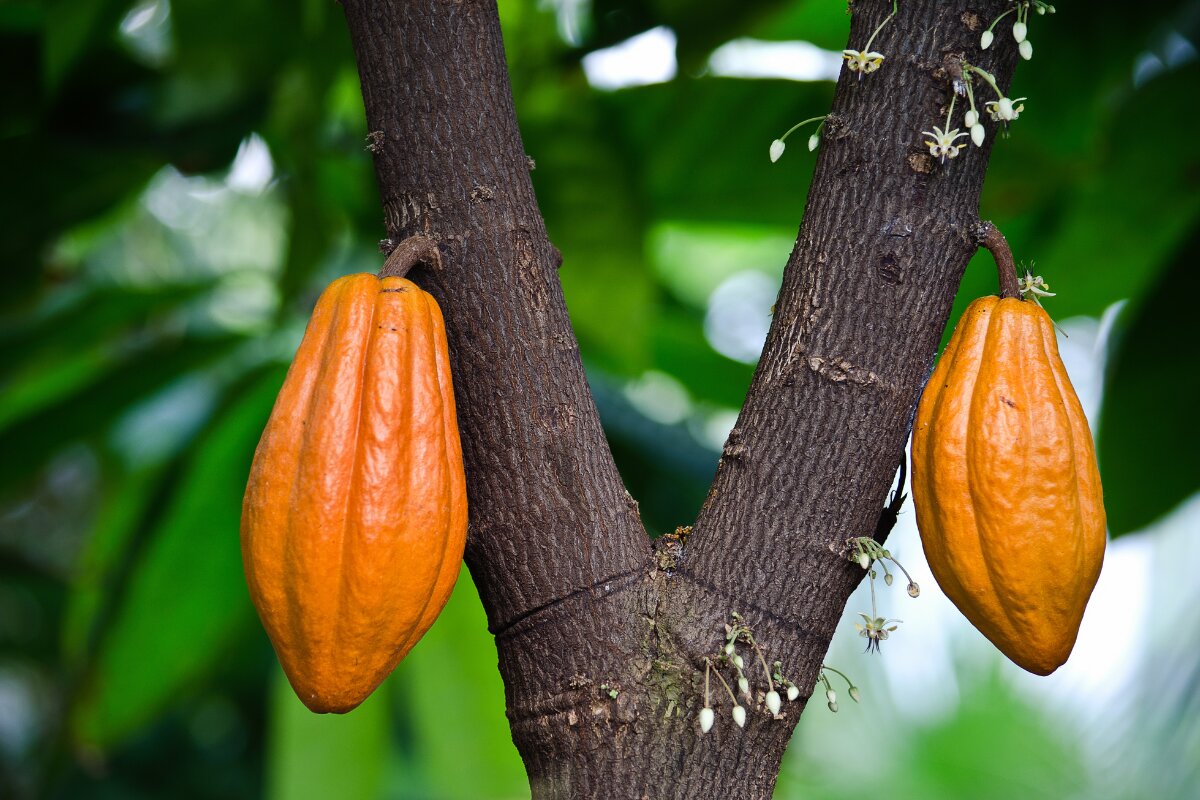


In England, Christmas trees in the 14th and 15th centuries often had what type of edible decorations?
A) Candy cane
B) Stringed popcorn
C) Apples
Apples!
HRISTSAMC OOKCISE
CHRISTMAS COOKIES
ULLDEM INEW
MULLED WINE
On Christmas, most British families indule in "Christmas P_________"
A) Popcorn
B) Pudding
C) Pancakes
The Christmas pudding originated in the 14th-century as a sort of porridge, originally known as “frumenty”, which bears little resemblance to the dessert we know today.
While Christmas pudding today is sweet, it was originally savoury.
It was originally made with hulled wheat, boiled in milk, seasoned with cinnamon and coloured with saffron. It was associated with meatless days, lent and advent and was often served as a plain dish. But there are a variety of recipes which included additions such as beef, mutton, raisins, currants, prunes, wines and spices.
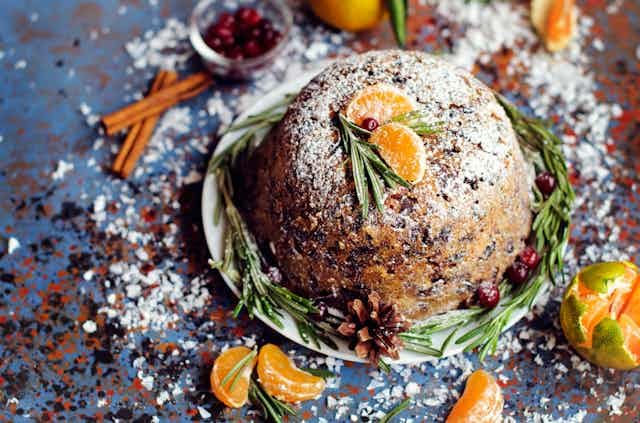
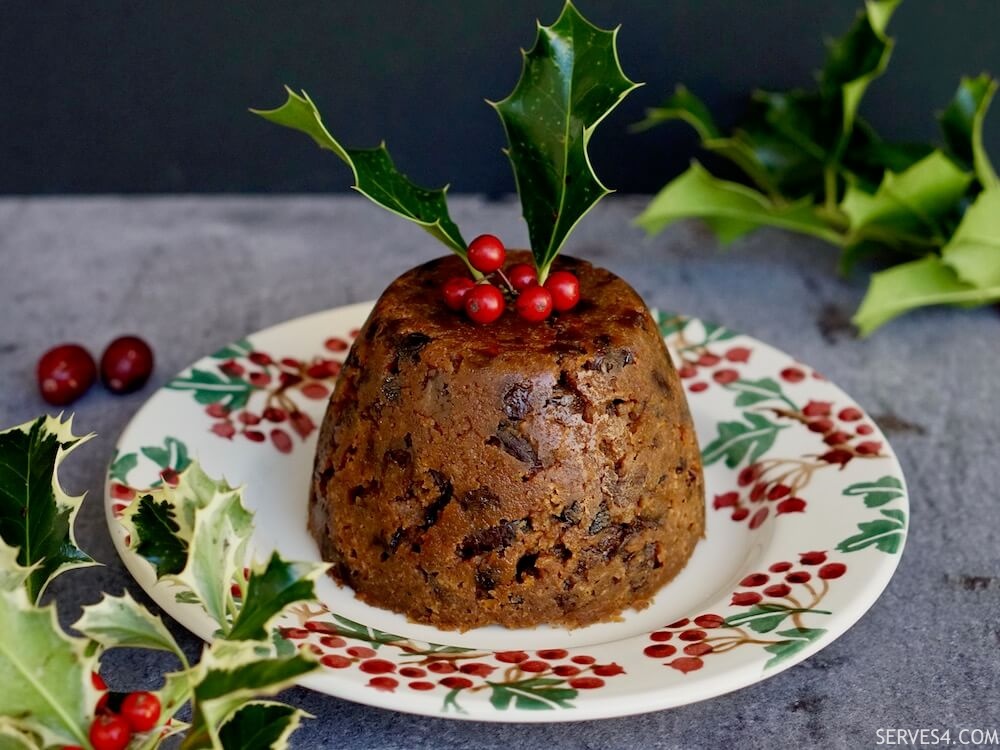
While most folks dine on Turkey for Christmas dinner, it hasn’t always had pride of place at the festive table. Before explorer Sebastian Cabot introduced turkey to England in the 16th century, rich people dined on:
A) Peacock
B) Swan
C) Pigeon
Peacock and Swan!
In the ancient preparation, the peacock was skinned so that its feathers remained intact; after the bird was roasted the plumage would be reattached to make a spectacle on the serving platter. However, the antiquity of this dish was not enough to keep it part of the Christmas feast.
Swan remained a delicacy eaten as part of Christmas celebrations right up until the 18th century.
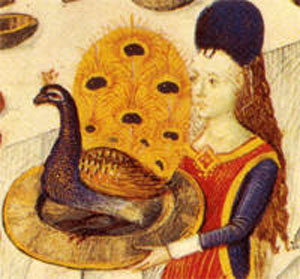
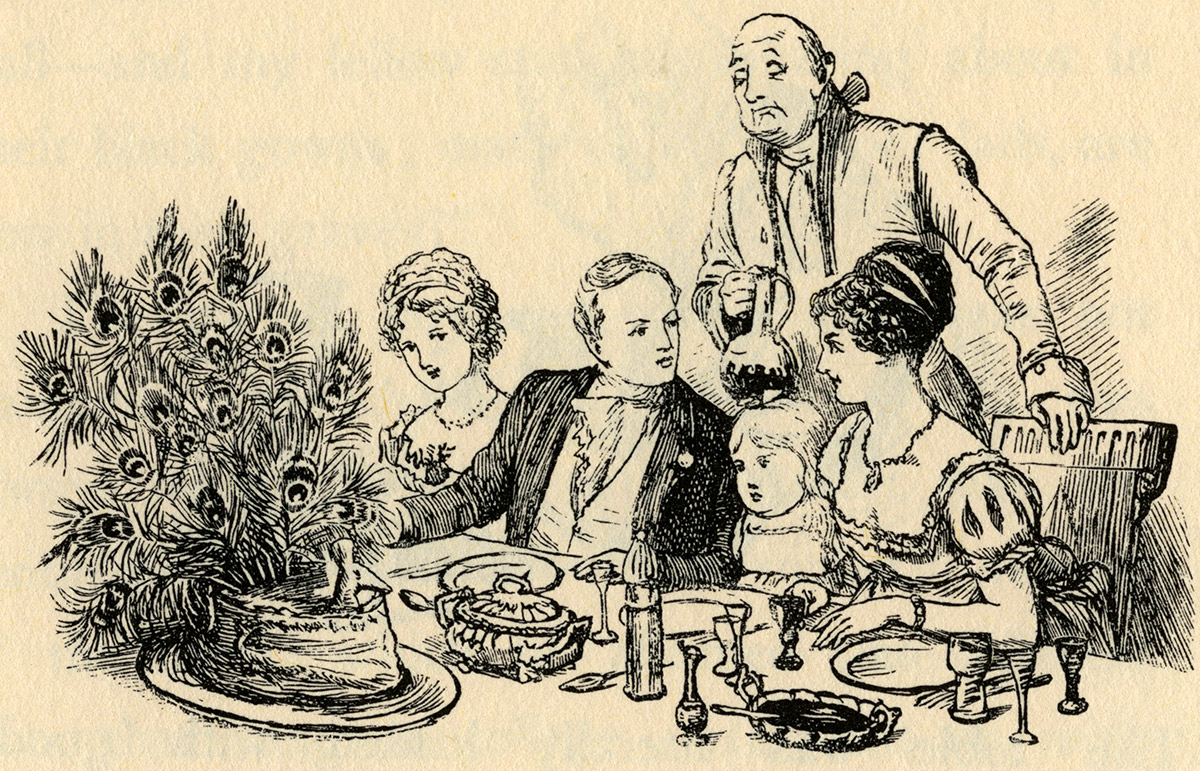
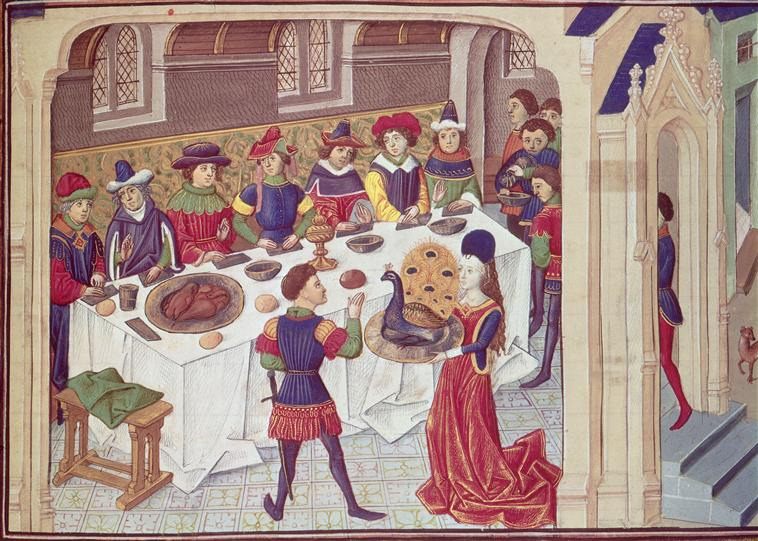
The Dutch often left what at the fireplace filled with food for Santa?
A) Stockings
B) Shoes
C) Buckets
Shoes!
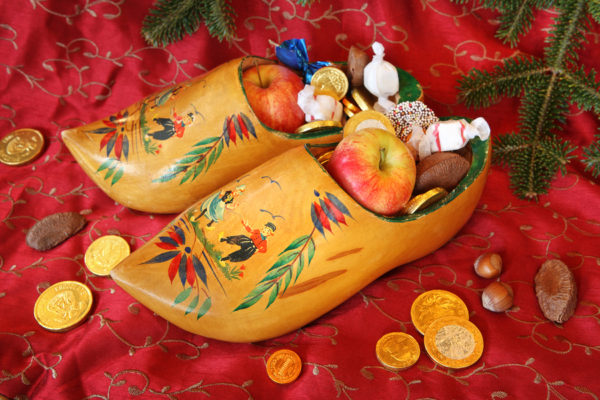
Before going to bed in the evening children put their shoes next to the fireplace or outside the front door in the hopes that Sinterklaas will leave a sweet treat in their shoe. In their shoe, they leave a carrot or some hay and a bowl of water nearby "for Sinterklaas' horse", and the children sing a Sinterklaas song.
GINGERBREAD HOUSE
HRISTCMAS UNPCH
CHRISTMAS PUNCH
In China, one prominent Christmas tradition is sending gift wrapped _______ to your loved ones:
A) Apples
B) Moon Cakes
C) Angels
Apples!
Over just the past 10 years, apples have emerged as a Chinese Christmas icon: exquisitely wrapped fruit with images of Santa Claus and stenciled “Merry Christmas” greetings in cursive. Apples are everywhere: They bejewel gigantic holiday-themed installations at swanky shopping malls, are sold from the back of trucks at makeshift night markets, and sit patiently inside vending machines. There are bare-bones versions stenciled with figures of Santa Claus playing the saxophone, and more extravagant ones wrapped in red cellophane with a bow tied on top.

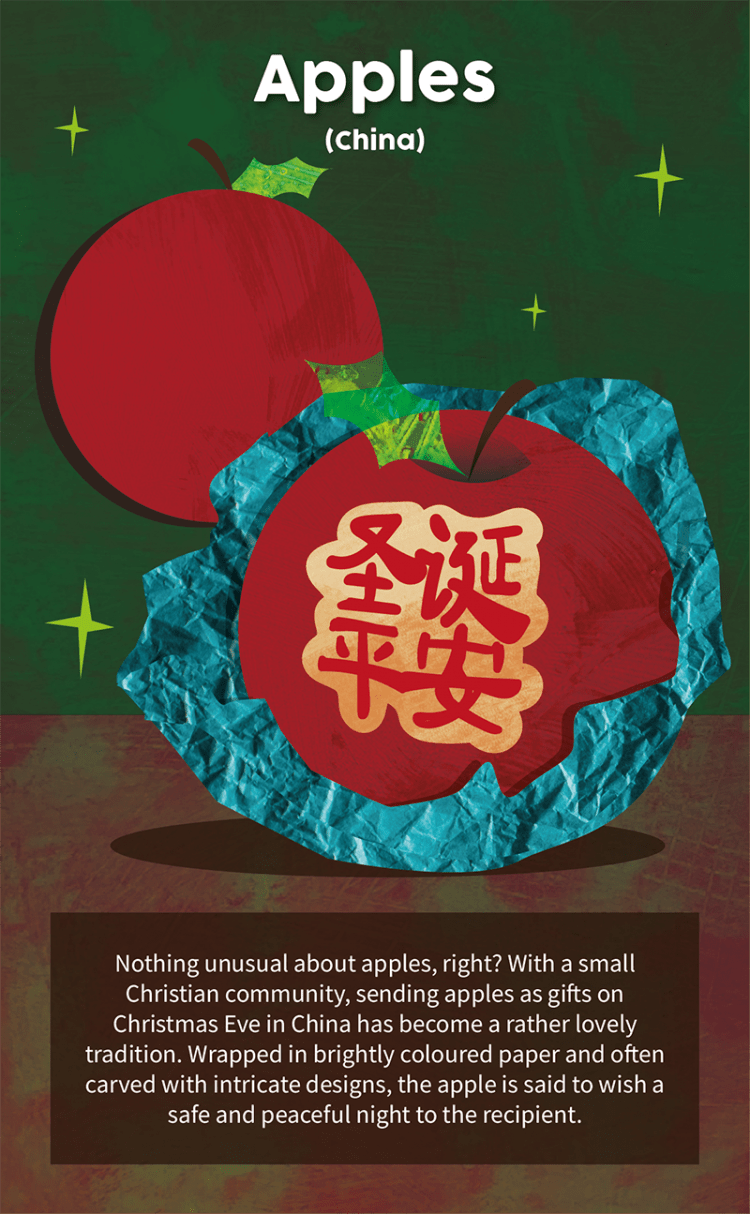
Which fruit is traditionally placed inside Christmas stockings?
Oranges!
The holiday tradition may have started during the Great Depression, a time when many families couldn't afford to buy holidays presents and gifted these sweet and hard-to-come-by fruits instead. Waking up on Christmas morning and finding a fresh orange in your stocking was considered a luxury.
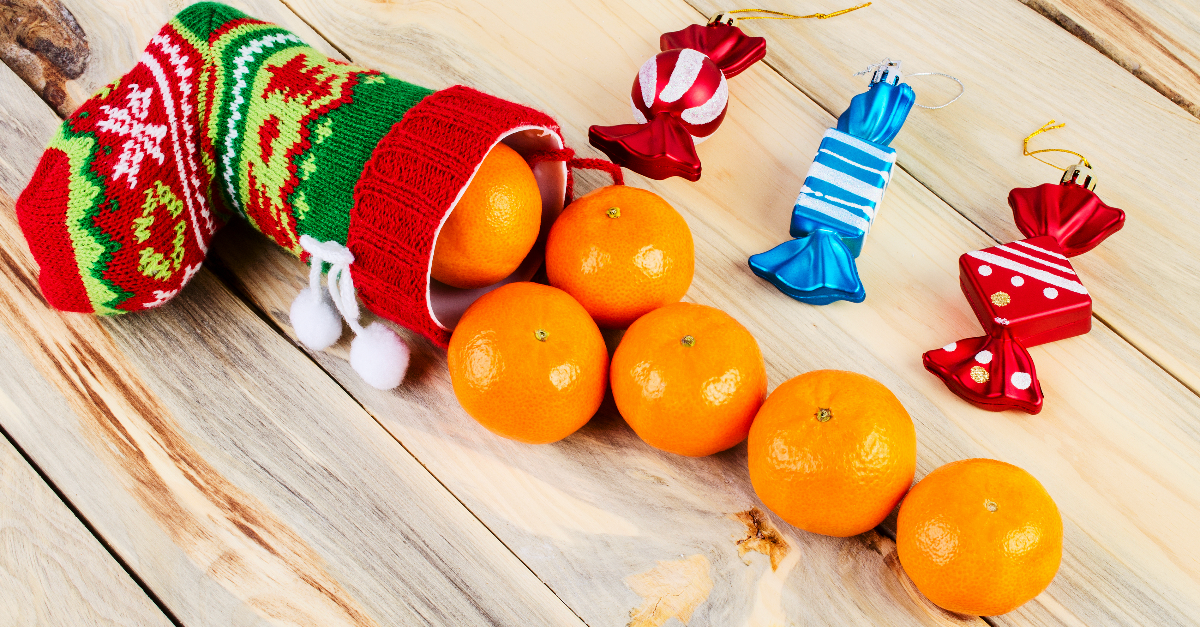
What is the most popular Christmas fruit worldwide?
Cranberries!